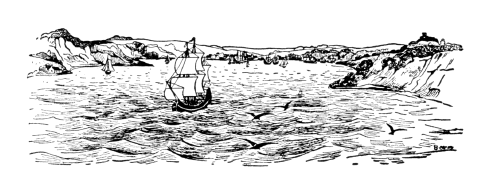| 1999-2004 (Return to Web Text-ures) |
Click Here to
return to The Voyage of the Mayflower Content Page Return to the Previous Chapter |
 (HOME) |
| 1999-2004 (Return to Web Text-ures) |
Click Here to
return to The Voyage of the Mayflower Content Page Return to the Previous Chapter |
 (HOME) |
THE DEPARTURE


THE Holland ship being then ready
to depart and all preparations having been made, the last day was given
to humiliation and prayer, their pastor, John Robinson, who was not to
accompany them, taking his text from Ezra viii. 21:
As written by William Bradford in
his journal it is recounted:
Later in the same day they betook themselves to Delftshaven, the port of Delft, eight miles distant on the Meuse and four-teen miles from Leyden. Then they realized, if never before, that they were Pilgrims, a title which properly belongs to the Plymouth colonists alone. On July 22, 1620, with a fair wind and tide, sail was hoisted on board the Speedwell, and the low shores of the Zeeland soon sank below the horizon. A few hours of pleasant sailing brought their craft off the Hampshire port of Southampton, where they found the Mayflower, Thomas Jones, master, awaiting them, having arrived seven days before from London with that branch of the expedition on board. The Mayflower was anchored at the west quay, and upon the Speedwell coming alongside the company was distributed for either ship as was deemed most advantageous and a governor and an assistant chosen for each. Soon, all being apparently in readiness, the representative of the merchant adventurers having journeyed thither to arrange final details, there again arose minor difficulties in respect to the claims of the adventurers upon the future operations of the Puritans, aside from the settlement which they now set out to found. These points being ultimately settled to the mutual satisfaction of all concerned, last good-bys and God-speeds were said, and the two ships loosed their bonds and slowly dropped down Southampton water, past the stony cliffs of the Isle of Wight and out into the English Channel, on the fifth day of August. The voyagers on board the ships, and their kindred left behind on land gave themselves up alike, to the mercy of God's kindness in the present, as in the past, and, as they hoped, in the future to come. Hardly had the ships gotten well to sea when the master of the Speedwell complained of his craft as being leaky and unseaworthy. Accordingly they were forced to put into Dartmouth, the larger vessel accompanying them. With the combined efforts of the two ships' companies the damaged hull was repaired as to be adjudged safe, but after having sailed again at sea about one hundred leagues the master further complained of his ship being entirely unfit for the voyage, and again they bore up for land and made the port of Plymouth, in the southeast of England. Here the smaller vessel was pronounced structurally weak, over-sparred, and unsound, which, however, was a subterfuge put forth by the wily master and his crew, who feared to make the voyage and wished to free themselves from their agreement. It was then decided to release the Speedwell and her crew and for the Mayflower to proceed upon her voyage alone. This necessitated a new parceling out of souls, which was soon accomplished. Not all could be accommodated on board the Mayflower, however, although as many as could be safely provided for were taken, those left behind returning forthwith upon the Speedwell to London. It was fortunate for the overloaded Mayflower that their stay in Plymouth Harbor was short and that they were blessed with pleasant weather during the time, the port of Plymouth being only a shallow, unprotected harbor, in southwesterly gales its waters rising into enormous waves, with depressions between so deep that ships at anchor sometimes struck bottom and were dashed in pieces. |